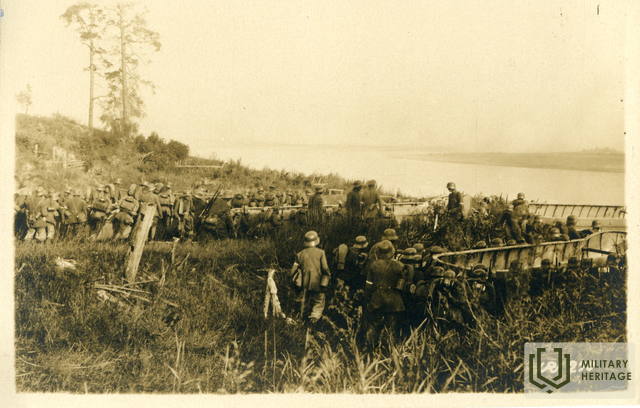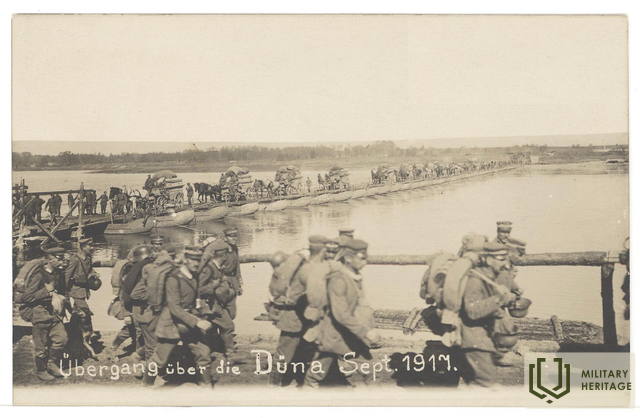Mažosios Juglos upės mūšis / Rygos operacija

Pasakotojas aprašo savo įspūdžius apie Rygos operacijos pradžią, kai vokiečių armijos artilerija pradeda apšaudyti Rusijos armijos pozicijas. Jis aprašo Rusijos armijoje tvyrantį chaosą ir Latvijos šaulių nuotaikas prieš mūšius.
„Ankstų rugsėjo 1-osios rytą mus pažadino nuožmus ir nenutrūkstamas artilerijos apšaudymas iš Dauguvos pusės prie Dunonio upės. Nebuvo jokių abejonių – ten prasidėjo mūšis. Skubiai pasibalnojome arklius ir patraukėme Ropažių dvaro link. Šauliai rinkosi prie atskirų sodybų. Jaudulys. Į štabą atėjo žinia iš armijos vadovybės, kad vokiečiai bandė kirsti Dauguvą, bet buvo atstumti. Tačiau šia žinia nebuvo galima patikėti. Laikas bėgo, o įdubęs Dunonio krantas nesitraukė. Keliuose pasirodė pabėgėliai, sakantys, kad vokiečiai jau šioje Dauguvos pusėje. Atėjo sužeisti kareiviai ir bėgantys rusų kareiviai be ginklų, o kai kurie net be kepurių. Mūsų įsakymas buvo suimti dezertyrus ir grąžinti juos atgal. Velgios pastangos. Bėgančiųjų skaičius kas valandą didėjo, kaip ir sužeistųjų bei dujomis apsinuodijusiųjų.“ Šaulių jaudulyje – kodėl mūsų nesiunčia į frontą, nes ten verda kaip raganos katilas. Sužeistieji sako, kad po itin... „...smarkia ugnimi, įskaitant ir dujinius sviedinius, vokiečiai kirto Dauguvą ir privertė Rusijos kariuomenę trauktis. Tačiau armijos štabas vis dar praneša, kad vokiečių atakos sėkmingai atremtos. Daugiau nebėra ko laukti. Žiemgalos kuopos pradeda rinktis kelyje. Atvyksta šaudmenų vežimai. Šauliai skubiai ima iš jų šovinius ir rankines granatas. Neįprastas vaizdas – iš Ikškilės pusės ateina išsibarstę pralaimėjusios Rusijos armijos kovotojai, važiuoja į armijos automobilius suklupę kareiviai. Visi tik skuba šalin, bet čia, glaudžiai išsidėstę eilėmis, šauliai stovi ir laukia įsakymo eiti pirmyn. Aludės gale susirinko kelios pabėgėlių žmonos, rimtai ir liūdnai žiūrėdamos į mus – Latvijos kareivius. Jauna mergina, pririnkusi jurginų žiedų, ateina ir pradeda juos dalinti arčiausiai esantiems lankininkams.“
„Karlo Baltgailio prisiminimai“, p. 13–17 (Latvijos karo muziejaus fondas). Prieinama: http://latviesustrelniekusaraksts.lv/Kaujas_darbiba/Book_3.html





